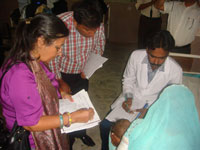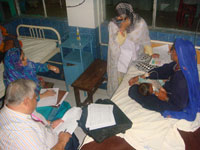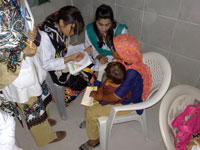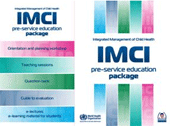Report on 2010 IMCI Coordinators’ meeting now available online
The report on the Regional IMCI Coordinator’s meeting held in Sana’a, Yemen, 6–9 December 2010 is now available for downloading. The report covers progress in under-five mortality reduction and implementation of IMCI in countries in the Region, work on child health country profiles, interventions to increase access to quality child health care, especially through community-based health providers and mobile teams, progress in IMCI pre-service education, updates on regional work and on the “Countdown to 2015: Tracking progress in maternal, newborn and child survival” initiative, indicators on infant and child feeding practices and the child health financial situation. A news item summarizing the meeting was also posted on this web site in December 2010.
Evaluation of IMCI pre-service education at Liaquat University, Pakistan
 A regional team from WHO evaluated the process and outcomes of the incorporation of the integrated management of newborn and child illness (IMNCI) into the paediatric teaching curriculum at Liaquat University of Medical and Health Sciences, Jamshoro, Sindh province, Pakistan, from 17 to 20 October 2011.
A regional team from WHO evaluated the process and outcomes of the incorporation of the integrated management of newborn and child illness (IMNCI) into the paediatric teaching curriculum at Liaquat University of Medical and Health Sciences, Jamshoro, Sindh province, Pakistan, from 17 to 20 October 2011.
The main objective of the evaluation was to assess whether the introduction of IMNCI in the department's teaching programme in 2010 had led to students’ competence in managing sick children with common health problems according to the IMNCI guidelines and make recommendations to further strengthen the teaching programme.
The evaluation was carried out according to the standard methodology described in the “Guide to the evaluation of IMCI pre-service education”, developed by WHO Regional Office.
After reviewing the information on the paediatric department and IMNCI teaching process and methodology, the team:
- observed several outpatient clinical and theoretical teaching sessions;
- visited the library and teaching sites;
- conducted focus group discussions with students and teachers involved in IMCI in both the paediatrics and community medicine departments;
- assessed student knowledge through a written test of multiple-choice questions and case scenarios;
- assessed student clinical skills through observation of case management practised by students.
- Finally, the team provided feedback to the vice-chancellor and staff of the University, including the dean and heads and teaching staff of the departments concerned.
 Overall, the environment at Liaquat University is very supportive to IMNCI teaching, which has formally endorsed it at high level in the institution. A provincial IMNCI pre-service training committee has also been established to coordinate this initiative in schools in the province, which has been supported by several national and international partners.
Overall, the environment at Liaquat University is very supportive to IMNCI teaching, which has formally endorsed it at high level in the institution. A provincial IMNCI pre-service training committee has also been established to coordinate this initiative in schools in the province, which has been supported by several national and international partners.
All teaching staff at the paediatric department have been trained in IMNCI, with a staff-to-student ratio of 1:13 for both practical and clinical sessions. More than a third (35%) of total teaching hours are allocated to IMNCI.
Teaching of IMNCI is, in general, consistent with traditional, classical paediatric teaching, well integrated throughout the curriculum and materials, interactive and makes use of a variety of teaching methods, with sessions including the full range of theoretical, practical and clinical sessions.
The outpatient department has been set up in a way conducive to teaching IMNCI, with a smooth flow of patients.
IMNCI-related items have been included in student examinations, with 30% of total marks assigned to IMNCI.
 Reference materials are available in the library and regularly used by students.
Reference materials are available in the library and regularly used by students.
Approaches to sustain the initiative in the long term have been adopted and teaching has been enhanced based on review of the experience.
Teaching staff’s and students’ attitudes towards IMNCI are very positive, with students greatly appreciating the variety of teaching methods and clinical sessions.
Overall, students performed well in both the knowledge and clinical assessment tests, showing confidence with the topics and clinical skills: 79% of the students assessed obtained an overall score of at least 80% in the case management skill test, based on to the IMCI standard protocol as a gold standard. The two tests have helped identify teaching areas which may be further enhanced.
This was the fifth such evaluation after those carried out by the Regional WHO team in Egypt and Sudan.
IMCI pre-service education package now available for downloading
 The IMCI pre-service education package has been developed by the Regional Office in close collaboration with medical schools in the Region to assist teaching institutions in introducing, implementing and assessing undergraduate teaching programmes that include the IMCI approach. Over 50 medical schools have to date introduced the Integrated Management of Child Health (IMCI) approach into their teaching programmes. The package comprises the following publications.
The IMCI pre-service education package has been developed by the Regional Office in close collaboration with medical schools in the Region to assist teaching institutions in introducing, implementing and assessing undergraduate teaching programmes that include the IMCI approach. Over 50 medical schools have to date introduced the Integrated Management of Child Health (IMCI) approach into their teaching programmes. The package comprises the following publications.
- IMCI pre-service education: orientation and planning workshop: facilitator guide is designed to assist in the conduct of in-depth participatory workshops for teaching institutions to develop plans to introduce IMCI into the teaching programmes. The guide, tested in an intercountry workshop in July 2009, includes detailed guidelines, presentations and tools to support this task.
- IMCI pre-service education: teaching sessions , with lesson plans to support planning and conduct of IMCI-related teaching sessions within the paediatric and community medicine teaching programmes, describes the student learning objectives, content and procedures of each session. The content was thoroughly reviewed by an expert group in 2008.
- IMCI pre-service education: guide to evaluation is a comprehensive tool to assess whether IMCI pre-service education as a public health intervention improves students’ competencies in managing main childhood health problems in outpatient settings. Extensively reviewed through expert consultations and tested in four medical schools, this guide comes with a user guide to data entry and analysis and a CD with the relevant e-forms and programme files.
- IMCI pre-service education: question bank is a resource library of multiple-choice questions and case scenarios suitable for evaluations of IMCI pre-service education and student formative and summative assessments. It has already been used to develop student knowledge tests for evaluations in two medical schools, in 2009.
- IMCI pre-service education: e-lectures on CD provides standard technical content as a resource to support IMCI-related teaching.
- IMCI pre-service education: e-learning material for students on DVD is designed to support students’ learning at their own pace through an electronic, interactive medium.


